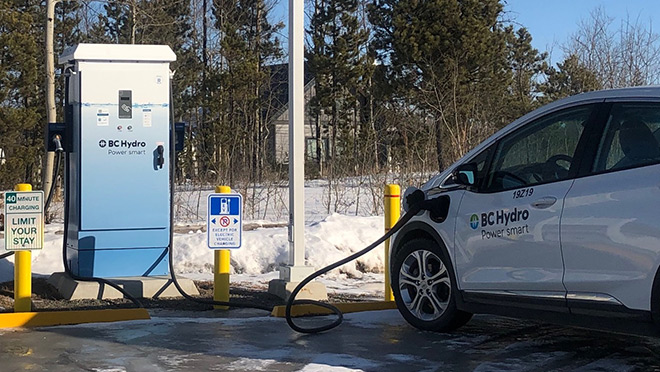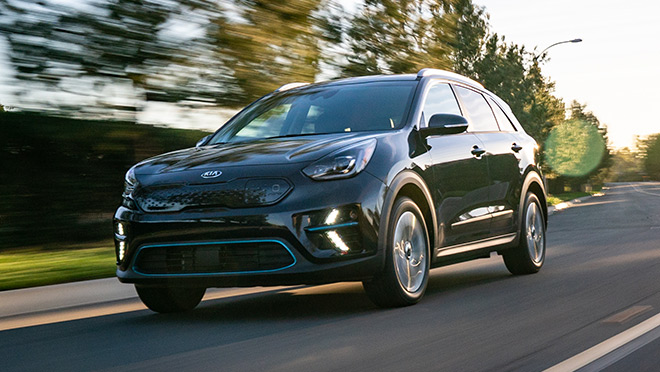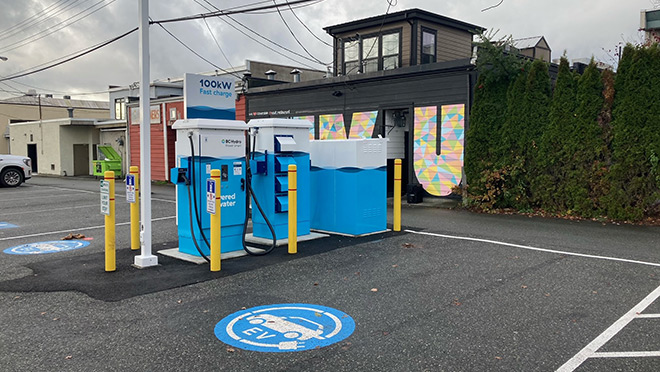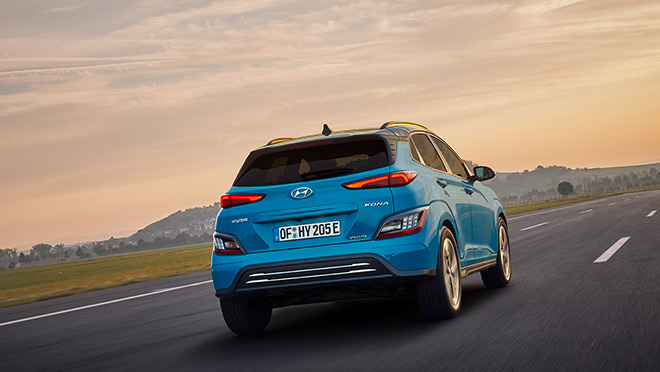22 reasons why you'll drive an EV (sooner or later)

Resistance is futile... unless we're talking about regenerative braking
It's hard to drive anywhere in B.C. these days without spotting at least one EV. The drivers of B.C. are falling hard for zero-emission vehicles. In fact, B.C. continues to have the highest EV adoption rate in North America, likely due to provincial rebates making it more affordable to purchase an EV, and a robust network of fast-charging stations making it convenient to own.
Do you still love your gas-powered vehicle, even if it kinda hates the planet? That's fine. Just brace yourself for the inevitable break-up, and understand that it's not going to be a bad one. You're going to love your new partner.
Given that it's now 2022, here are 22 reasons why.
1. The costs of running vehicles on gas are a double-whammy
As of December, the price of a litre of gas in Vancouver was around $1.56 per litre, and prices were high across B.C. Those high prices are changing the math on the long-term costs of EV ownership, as higher purchase prices for EVs are eventually offset by savings on fuel and maintenance costs. But the other big factor is the CO2 emissions costs. Greenhouse gas emissions from transportation account for 37% of all emissions in B.C.

2. There's a wide variety of EV models (and price points) available,
There are more than two dozen battery-electric vehicle models available in B.C., and about half of those vehicles can be purchased for less than $55,000, which qualifies you for combined federal and provincial EV rebates of $8,000.
3. EVs are fast and fun to drive
If you’re on the fence about buying an EV and have never driven one, it’s time to take one for a spin. The acceleration of most EVs is a game-changer, making it fun and practical as a nimble commuter or as a powerful thoroughbred on the open highway. Who could have predicted that a Kia (the soon-to-be released dual-motor EV6 GT) would be capable of going 0-to-60 mph in 3.5 seconds? In case you're counting, that's faster than a Porsche Taycan 4S.
4. The EV with a 400-km range is no longer a rarity
EV range has come a long way in recent years. Ranges of 400 km and more were once the exclusive territory of Tesla, but that's no longer the case. There are at least a dozen EV models that could get you from Vancouver to Kamloops without having to stop to charge. These include the Chevy Bolt and Nissan Leaf S Plus (both available for $31,000 or less after rebates), the Hyundai Kona and Kia Niro SUVs, the Volkswagen ID.4 and the Ford Mustang Mach-E.
5. Oil changes and brake jobs are so passé
EVs are famously low maintenance, so you can say goodbye to oil changes and regular visits to the garage. And because electric vehicles are equipped with regenerative braking that sends power back to your battery, the traditional friction brakes on an EV are barely used. There have been reports of some EV drivers not needing a brake job for more than 500,000 km. It's a brave new world.
6. You can get a rebate of up to $350 for a home charger
You could charge slowly overnight via your basic plug-in-the-wall 110-volt trickle charge. But most owners install a Level 2 charger at their homes, as it can cut that charging time in half. You'll usually only need a top-up that takes a couple hours, but on those rare occasions when you almost drain the battery, a Level 2 will get the job done in 6 to 14 hours, depending on the size of your EV's battery pack. Single-family homes can get a rebate of up to 50% on the purchase and installation costs of an eligible Level 2 EV charger, to a maximum of $350.
7. Most EV owners say they'll buy another one
A 2021 survey of EV owners in the U.S. found that 82% "definitely will" consider purchasing another EV in the future, even if many aren't certain they'll stick with the same brand they drive today. There's now a lot of competition out there, and in terms of owner satisfaction, the Kia Niro EV tops the list, followed by the Chevy Bolt and Hyundai Kona EV, while Tesla's Model S and Model 3 take the top spots in the premium category.
8. Fast charging is fast, and getting faster
The standard for public fast charging, including charging on BC Hydro's network, is 50 kW, which is good to take most cars to 80% within 45 minutes. And while experts argue that that may remain the standard going forward – with most owners willing to take a break for a coffee or a quick bite while topping up their EV – the technology is there for faster charging. Recently BC Hydro added its first-ever 100-kilowatt EV fast charger to its network of more than 100 fast chargers across B.C., with plans to add more in 2022. The station, located in Cloverdale, can charge an EV in just 15 to 20 minutes.

9. Apartments and condos are getting EV ready
Newer condos in several B.C. cities are already pre-wired for EV charging in parking spots. And for older condos and apartments, EV Ready rebates are available to get a building ready to accommodate high levels of future EV charging. The idea is to set up parking spaces with energized outlets with a cover, so that they're ready as a final connection point for a Level 2 EV charger. The program also includes rebates for the final step, the purchase and installation of chargers.
10. Plug-in hybrids remain popular, and options are expanding
Some of us aren't ready to make the switch to full electric, but want to be able to drive electric most of the time. That's where plug-in hybrids are tempting, from the Toyota Prime (Prius or RAV-4 SUV), to the Honda Clarity, Mitsubishi Outlander, Subaru Crosstrek, Hyundai Ioniq, and Mini Countryman Cooper SE to the made-in-Canada Chrysler Pacifica minivan. Luxury options include the BMW 330e we tested on a trip to the B.C. Interior earlier this year. There are combined federal and provincial rebates of up to $4,000 on the purchase of plug-in hybrid vehicles.
11. B.C. has more than 2,500 public charging stations
There are now more than 2,500 electric vehicle (EV) public charging stations in B.C., and they’re becoming much more common right across North America. Almost all major highways are now included in fast-charging networks, including seven charging stations along Highway 3 from Prince George to Prince Rupert.
12. You're going to love the 'frunk'
If you think the idea of an electric Mustang is weird, wait until you pop the front trunk (or "frunk"). There's no engine or motor, only a small storage space that's designed to act as a cooler, complete with a drain. You'll find frunks of various sizes on EVs, from the Tesla 3 (which has spawned ideas such as this customized luggage bag set) to the Ford F-150 Lightning electric truck's supersized frunk.
13. The used EV is now a practical option
Early-adopting EV drivers are starting to upgrade their electric rides to something newer. That means that more and more used EVs are becoming available, sometimes at a steep discount. If you're looking for a car to commute in, these earlier EVs and their more moderate battery ranges, can be a great choice. Learn more about buying a used EV, and make sure you find out how much a battery pack has "degraded", as older EVs can lose 20% or more over time. If you have a short commute, a modest range may not be an issue.
14. It's getting easier to test drive an EV
There hasn't been much incentive for dealerships – especially those selling both gas and electric vehicles – to arrange test drives. Gas-powered vehicles tend to make dealerships more money due to the far higher servicing and maintenance costs. Schedule your test drive in advance, ask that the dealer charge the vehicle before you arrive, and if you strike out, look for alternatives. Several B.C. EV enthusiast organizations, such as Emotive, the Vancouver Electric Vehicle Association (VEVA), and the Victoria EV Club, are keen to share their knowledge and advice. Look for test drive events or the chance to go on a ridealong. Learn more about test drives.

15. There's a good chance there's now an SUV for you
Electric SUV selection is no longer limited to the pricey Tesla Model X, which is just one of 14 different small-to-medium size SUVs available in B.C. with seating capacity ranging from five to seven passengers.
17. If you like music, you'll love an EV
The silence of an electric vehicle isn't just music to the ears of homeowners who live alongside busy streets. It's also music to the ears of anyone who enjoys listening to their favourite tunes in the car. There's no engine noise to mess with the proceedings, and automakers know it: most EVs come with premium sound systems, either as standard or optional equipment.
18. You can go for weeks (or months) without a fuel stop
The luxury of topping up at home overnight can pay off in rare visits to public charging stations, especially if you're like most people and the vast majority of your drives are short trips. That includes drivers of plug-in hybrids, too, as a short commute and home charging can add up to little need for using a PHEV's gas engine.
19. B.C is the best place on the continent to drive an EV
It's no surprise that a greater percentage of British Columbians own EVs than anywhere else in North America. It's a far greener choice here than in most regions, thanks to the power of water (BC Hydro's mainly hydroelectric power generation is 98% clean). B.C. is also home to a variety of EV rebates and BC Hydro fast charging stations at 70 locations (and growing), many alongside B.C.'s major highways.
20. In B.C., automakers are required to sell EVs
The Zero-Emission Vehicles (ZEV) Act, passed by the BC Government in 2019, requires automakers to meet increasing annual levels of EV sales to 10% of new light-duty vehicle sales by 2025, 30% by 2030 and 100% by 2040. And it's working, with EVs representing 9.4% of new car sales in 2020.
21. You'll enjoy the perks of owning an EV
If you're travelling solo during rush hour on the highway, you can't use that HOV lane... unless you're driving an EV. You'll also occasionally get a great parking spot while charging your car – just make sure you liberate the charger once you're charged to 80%. Using charging stations as parking spots is just bad car-ma.
22. You could save more than $150 per month on fuel
Once you're set up for charging at home, where most EV charging happens, the savings start adding up. Based on the charging needs of a 2020 Hyundai Kona electric driven 20,000 km per year over five years, you're looking at potential 'fuel' savings of $925 over that period. Learn more about fuel savings.